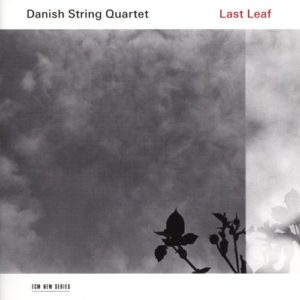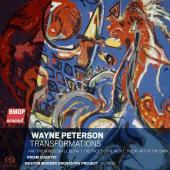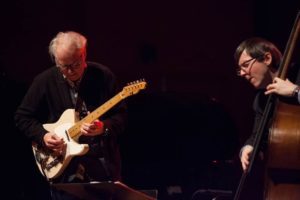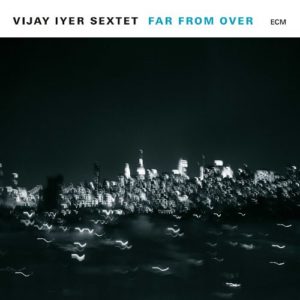
Verisimilitude
Tyshawn Sorey
Tyshawn Sorey, drums, percussion, composer; Cory Smythe, piano, toy piano, electronics; Chris Tordini, bass
Pi Records PI70
Tyshawn Sorey has had quite a year of musical accomplishments. After recently finishing up his doctorate at Columbia, he succeeded Anthony Braxton on the faculty at Wesleyan University, won a MacArthur Foundation Fellowship, and received several other major awards and commissions. He has remained active in a number of ensembles, playing a pivotal role on another of this year’s best CDs, Vijay Iyer Sextet’s Far From Over (ECM). Verisimilitude, for Pi Recordings, is his sixth recorded outing as leader. Sorey is joined by pianist Corey Smythe and bassist Chris Tordini in five adventurous and stimulating compositions.
A suitable overture, “Cascade in Slow Motion,” is buoyed by interlocking arpeggios from pizzicato bass and piano and punctuated by supply drummed polyrhythms. Clocking in at four and a half minutes, it is the only relative miniature here. Thereafter, Sorey and his colleagues explore long form music-making. An arco bass solo leads off “Flowers for Prashant,” which then turns into a dovetailing duet. A gradual intensification led by this duet texture takes place, only to hew back to drone-based passages of repeated notes.
Smythe uses electronics and Tordini high-pitched arco lines to begin “Obsidian.” After an extended introduction exploring these timbres, Tordini plays lower pitched glissandos and Smythe sepulcral bass note stabs. Sorey enters with textural percussion: a gong, a host of woody fills, and shimmering cymbals. A fulsome groove is established; Tordini returns to pizzicato bass, Smythe repeats bass register chords, and Sorey deploys a cannonade at the kit. Eventually, pointillism is reasserted with upper register piano chords and throbbing bass notes; Sorey moves back to cymbals and auxiliary percussion instruments. Smythe’s basso reiterations lead to a coda based on the second section. Then there is a gradual denouement, punctuated by long gong strokes and slithering bass register glissandos.
“Algid November” is the half-hour long centerpiece of Verisimilitude and is Sorey’s most ambitious piece for trio yet. Once again, the emphasis is on gradually morphing from one set of textures and playing demeanors to the next. The musical fabric consists at first of a prevailingly soft dynamic and slow tempo, one undergirded with big beats (never amorphous) that contains numerous angular feints and jabs from all three players. Sorey is a master at contrasting the resounding of instruments such as gongs and cymbals with the faster decay of drums and small percussion instruments; all interactions and decays are timed with precision. After a long period in which these juxtapositions are the focal point, Sorey performs at the drum kit with zeal, while Smythe and Tordini operate in a dissonant language of jagged filigrees.
A little less than halfway through, the piece moves from post-tonality to post-bop, with cascading arpeggiations from Smythe and walking lines from Tordini locked in a tight groove that Sorey simultaneously supports and overlays with contrasting elements. Just when one feels their toes tapping, the trio moves sideways in lockstep, back to the big beats of the opener but with a fuller overall texture. Rearticulated verticals, first low and then high, signal yet another change in direction. Smythe’s repeated notes pile up in an ostinato haze and Tordini grooves in still another timeframe while Sorey engages in lithe ornamentation. Two thirds of the way through the piece, a visceral build up leads to a huge crash of cymbals.
Afterwards, the musicians resume the slow tempo and fragile soundscape that began “Algid November.” Pitched percussion, quickly plucked bass melodies, and chiming piano lines give way to rattling reiterations from Sorey and Smythe. It is as if the big crash that signalled the piece’s climax is being allowed successive echos. Interpolations of the swing section, in tiny slices that last merely a breath or two, are juxtaposed with barbed jabs and intricately constructed rhythmic passages. Another gale storm threatens, then is subdued, devolving into muted piano notes and quietly reverberant gong rolls.
The final work on the CD, “Contemplating Tranquility,” opens with the same muted material that closed “Algid November.” Gongs and temple bells gradually coalesce into a new, still slow, pulse stream of pitched percussion, toy piano ,and then grand piano. Glassy piano harmonies are pitted against reiterated soundings of the gong. Smythe gradually adds arpeggios in the low register to replicate the lowest sounding frequencies of the gong. Filling in the registers, Sorey suddenly switches roles, adding trebly unpitched percussion to the proceedings where there had been piano. Toy piano and pitched percussion engage in a duet that is joined by a low rumbling and then sustained upper register arco lines and a generous dose of harmonics from Tordini. Smythe begins to build verticals in a more harmonically conceived direction, buoyed by more consonance — even an octave here and there — from the bass player. As things converge around the low E string of the bass, Tordini then has some fun of his own, throwing in notes that rend the heretofore harmonically grounded passage asunder. While Sorey weaves sustained cymbal passages, pianist and bassist create a duet that ebbs and flows in an ever narrowing dynamic spectrum. Temple bells suggests a possible return to the more contemplative demeanor of the opening. Instead, it is a signal that the meditation is over. Thus ends Sorey’s Verisimilitude, Sequenza 21’s Best Recording of 2017.










